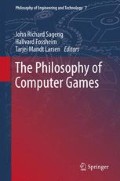Abstract
Every sort of human activity and invention is of interest to ethics. Normative theory is the part of ethics which tries to flesh out considerations and arguments about why one should act in a certain way rather than another. And such investigations encounter fresh challenges when faced with the plethora of computer gaming entities and events. Often and to a great extent, this is more broadly due to the fact that applying old regimes to new domains, or old tools to new machines, always requires some effort. But it may also be partly because there is something in the encountered phenomenon which is substantially new and not quite like anything we have faced before. In such cases, the consequences can still be anything from small scale tinkering to something like an intellectual revolution.
Access this chapter
Tax calculation will be finalised at checkout
Purchases are for personal use only
References
Crisp, Roger, and Michael Slote (eds.). 1997. Virtue ethics. Oxford: Oxford University Press.
Kant, Immanuel. 1997. Groundwork of the metaphysics of morals. Cambridge: Cambridge University Press.
Suggestions for Further Reading
Balkin, Jack M., and Beth S. Noveck (eds.). 2006. The state of play: Law, games, and virtual worlds. New York: New York University Press.
Bartle, Richard. 2003. Designing virtual worlds. Indianapolis: New Riders.
Borgmann, Albert. 1984. Technology and the character of contemporary life. Chicago: University of Chicago Press.
Chatfield, Tom. 2011. Fun Inc.: Why games are the 21st century’s most serious business. London: Virgin Books.
Consalvo, Mia. 2005. Rule sets, cheating, and magic circles: Studying games and ethics. IRIE 3(06/2005): 7–12.
Copier, Marinka. 2005. Connecting worlds: Fantasy role-playing games, ritual acts and the magic circle. In Proceedings of Digital Research Association (DiGRA) 2005 Conference: Changing Views-Worlds in Play,Canada, June 16–20, 2005. Vancouver: University of Vancouver.
Dibbell, Julian. 1999. My tiny life: Crime and passion in a virtual world. New edition. London: Fourth Estate.
Fairfield, Joshua. 2009. The magic circle. Vanderbilt Journal of Entertainment and Technology Law 11(4): 823–840.
Floridi, Luciano. 2010. The philosophy of information. Oxford: Oxford University Press.
Huizinga, Johan. 1955. A study of play element in culture. Boston: Beacon.
Ihde, Don. 1990. Technology and the lifeworld. From garden to earth. Indiana: Indiana University Press.
McIntyre, Alasdair. 1984. After virtue, 2nd ed. Notre Dame: University of Notre Dame Press.
Montola, Markus. 2005. Exploring the edge of the magic circle: Defining pervasive games. In Proceedings of Digital Arts and Culture, December 2–4, 2005, 1–4. Copenhagen: IT University in Copenhagen. http://users.tkk.fi/~mmontola/exploringtheedge.pdf. Accessed 7 June 2010.
Muggleton, David. 2000. Inside subculture: The postmodern meaning of style. Illustrated edition. Oxford: Berg.
Sicart, Miguel. 2009. The ethics of computer games. Cambridge: The MIT Press.
Spence, Edward. 2006. Ethics within reason: A neo-gewirthian approach. Maryland: Lexington Books.
Spence, Edward. 2007. Positive rights and the cosmopolitan community: A right-centred foundations for global ethics. Journal of Global Ethics 3(2): 181–202. July/August 2007.
Verbeek, Peter Paul. 2005. What things do. Philosophical reflections on technology, agency, and design. University Park: Penn State University Press.
Author information
Authors and Affiliations
Corresponding author
Editor information
Editors and Affiliations
Rights and permissions
Copyright information
© 2012 Springer Netherlands
About this chapter
Cite this chapter
Fossheim, H. (2012). Introduction to Part II: Ethics and Play. In: Sageng, J., Fossheim, H., Mandt Larsen, T. (eds) The Philosophy of Computer Games. Philosophy of Engineering and Technology, vol 7. Springer, Dordrecht. https://doi.org/10.1007/978-94-007-4249-9_7
Download citation
DOI: https://doi.org/10.1007/978-94-007-4249-9_7
Published:
Publisher Name: Springer, Dordrecht
Print ISBN: 978-94-007-4248-2
Online ISBN: 978-94-007-4249-9
eBook Packages: Humanities, Social Sciences and LawPhilosophy and Religion (R0)

